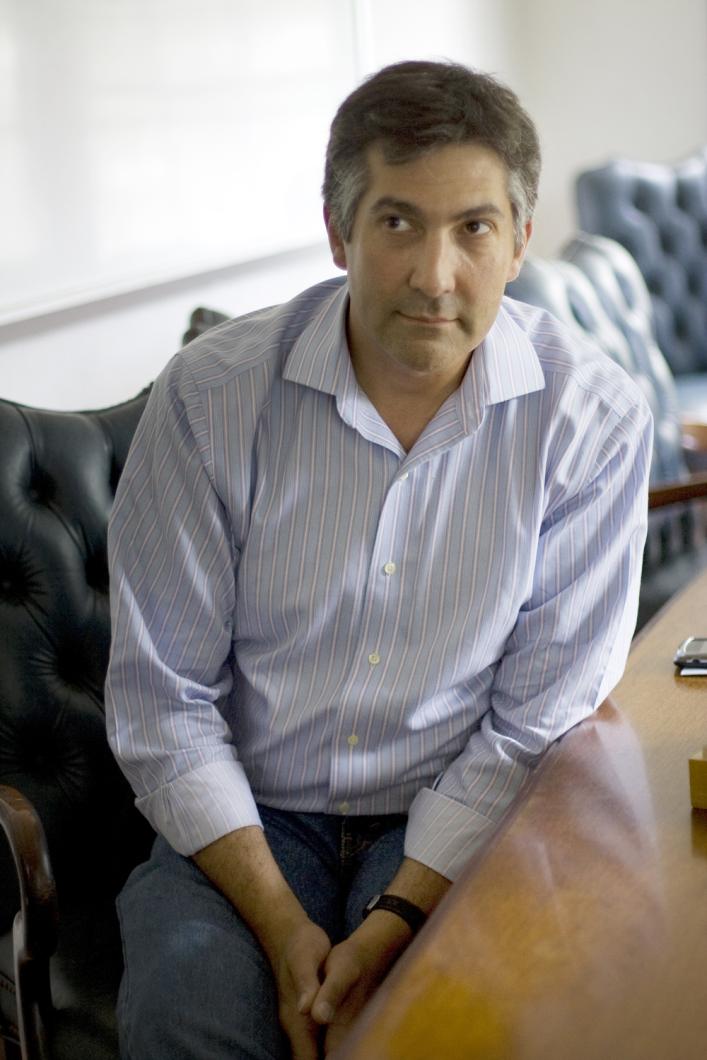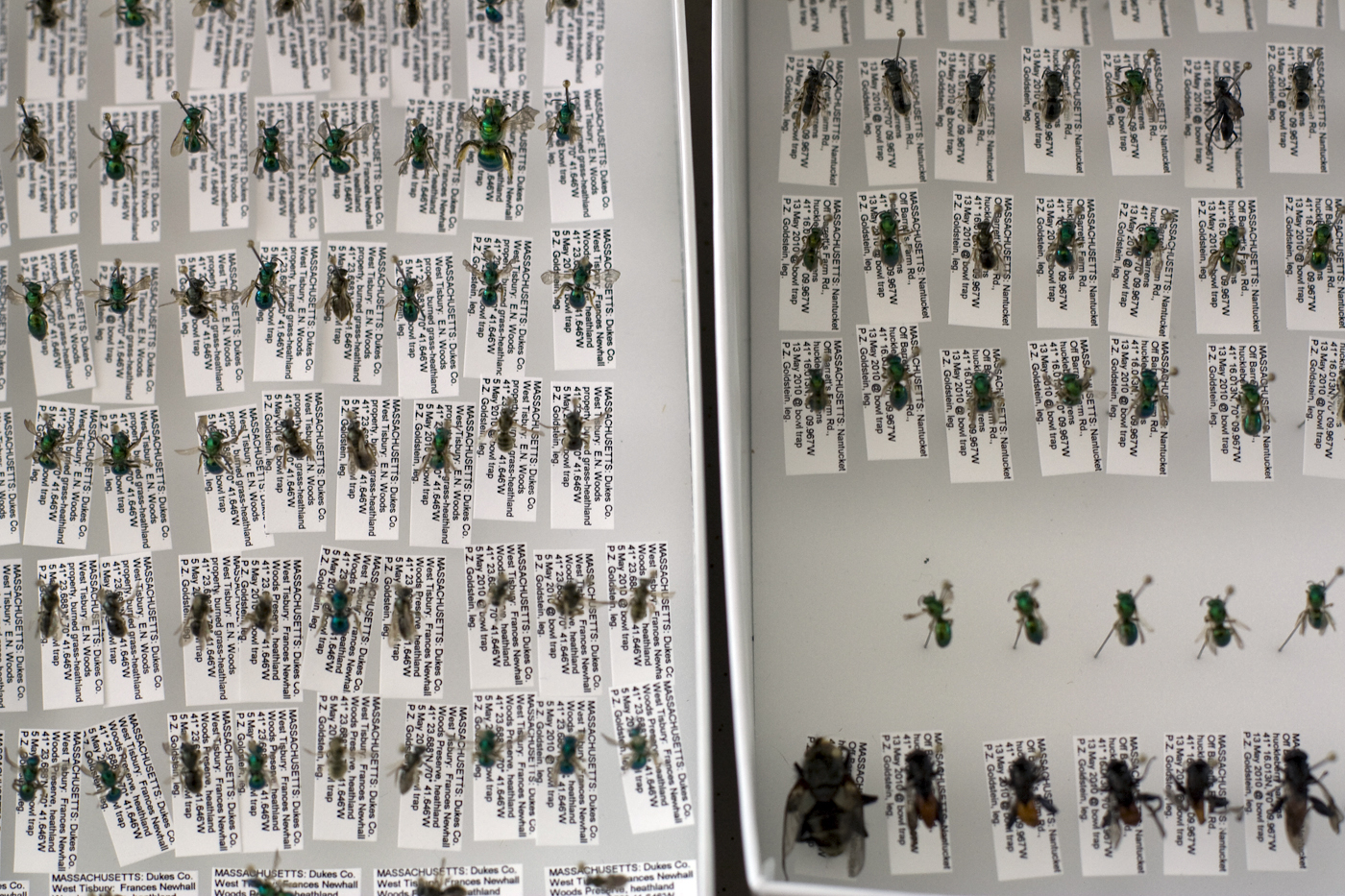Every morning since April 24, Paul Goldstein has set out 30 colored souffle cups with soapy water in them, a technique called bee bowling. He returns at the end of the day to collect a bounty of bugs from the dishes, hoping to find a few new species of bees in them.
Mr. Goldstein, a Vineyard Haven resident, traces his fascination with insects from an early age to his experience as one of Gus Ben David’s campers at Felix Neck Wildlife Sanctuary’s Fern and Feather camp.
Today a certified moth expert and entomologist, Mr. Goldstein began studying the bee fauna of the Vineyard after receiving a grant from the Edey Foundation through The Trustees of Reservations. Over the next five months, he will be catching, recording and studying native pollinators in order to create the largest inventory of its kind in Massachusetts.
The reason for this new study is due to the expanding pollinator crisis, which is causing a decline in species including bees, moths, bats and birds, creating repercussions in the natural world. And because they are one of the most efficient pollinators, bees are the focus of the study.
“Bees are keystone animals in the functioning of our natural areas as pollinators,” Mr. Goldstein said in an interview with the Gazette last week. “We lose bees, we lose a lot of flowering plants.”
On the Vineyard, fewer bees mean less food coming from farms. But before researchers can understand the effects bees have on agriculture on the Island, Mr. Goldstein and others first have to learn what’s here.
“We don’t have a good gauge about how serious the pollinator crisis is in terms of our native bees because in a lot of places like this one, we don’t have any baseline,” Mr. Goldstein said. “If we’re losing our native pollinators, people are afraid of a cascade effect.”
Bees are in flight from April to September, with the majority of activity seen in May and June. Mr. Goldstein described bees as charismatic “little flying teddy bears,” and he is gathering as many volunteers as possible, assisted by the staff at Felix Neck, to help collect pollinators for the project and its database.
Were you that little kid in the playground who was always chasing after bugs, pushing them in the face of your peers, gazing in amazement as you witnessed what the planet could produce? If you missed your chance to become an entomologist in life, this is your opportunity.
With the help of Islanders, Mr. Goldstein hopes to find between 200 and 300 species of bees on the Island, although he said he would be happy to get half of that.
After collecting the bees, Mr. Goldstein will rinse, wash and even blow-dry them for proper preservation. The bees are then pinned and labeled with date, location and species, and placed in a box.
“It’s a great lens to look through at natural areas,” Mr. Goldstein said. “It can tell us potentially a lot about land management, land use history, it’s a great looking glass.”
“Most people don’t know much about pollination and how dependent we are on it through agriculture, and a lot of the natural communities that depend on it,” Russ Hopping, ecology program manager for the Trustees, said last week. With the project, Mr. Hopping and others are hoping to educate individuals and farmers alike.
Mr. Hopping said that while individuals can help catch bees for the study, farmers can help by providing more habitat to native bees by leaving so-called pollinator strips of vegetation in their fields, near where they want pollination to occur.
“Many of the bees live in the ground and hollow branches,” he said, adding: “Providing acres of undisturbed areas . . . can provide habitat to native species.”
Caitlin Jones at Mermaid Farm in Chilmark does just that by growing hedgerows of wildflowers for the bees, and she said she loves landscaping with native goldenrod. “We get great pollination from them,” Mrs. Jones said.
“I wouldn’t have any yield if it wasn’t for them,” Lisa Fisher of Stannard Farms in West Tisbury agreed. She said she was looking forward to what the study would provide for farmers on the Island.
There is some confusion about the difference between native and nonnative bees. The honeybees that are used at Katama Apiary, for example, are nonnative, and are not as efficient pollinators as native bees, Mr. Hopping said.
Neil Flynn, owner of Katama Apiary and the only commercial beekeeper on the Vineyard, has in past years kept hives at Island farms. But after being completely wiped out last year due to an infestation of South African hive beetles, Mr. Flynn is down to 50 hives this year from his usual 100.
He said no farmers have called to request hives this year, but in the past those who have employed his service have seen an increased harvest by a third. “We’ve had a marvelous growing season this year,” Mr. Flynn said. “But that could change in a blink.”
Even honeybees are in decline, and every year brings more change to the landscape. “Exactly how that’s going to change we don’t know, and the impact of the change on the landscape is really unknown,” Mr. Hopping said. “Diversity is good, the more pollinators we have, the more likely when that change occurs we will continue to have pollination services, our pollinator community will be diverse and resist the change,” he added.
“Once we get an understanding of our pollinator fauna there are things we can do to make sure that they’re sustained,” Mr. Goldstein said. “Sustainability is the key buzz word, no pun intended.”
In conjunction with the United States Department of Agriculture’s National Pollinators Week (June 21 to 27), information sessions with Mr. Goldstein will be held on June 24 from 2:30 to 4:30 p.m. at Felix Neck Wildlife Sanctuary in Edgartown, and on June 30 from 2 to 4 p.m. at the Trustees’ Long Point Reservation in West Tisbury. For information about the events, or how to volunteer for the program, please call Felix Neck at 508-627-4850, or Long Point at 508-693-7662, extension 11.
This column is meant to reflect all aspects of agricultural activity and farm life on the Vineyard. To get in touch with Remy Tumin, please call 508-627-4311, extension 116, or e-mail her at rtumin@mvgazette.com.









Comments
Comment policy »